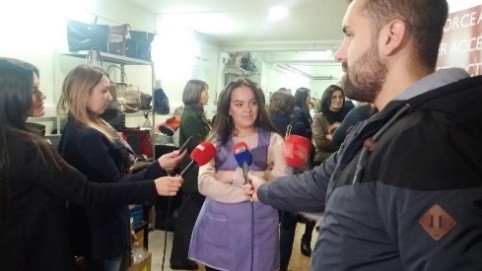Speeches Shim

BANJA LUKA — Unlike most of her peers in Bosnia and Herzegovina (BiH), Vanja Predanović decided at the age of 19 that it was time to find a job, become independent, and support her family financially.
Vanja was majoring in information technology at a university in Banja Luka, Republika Srpska, one of BiH’s two entities. But her family could not support her and her studies; making ends meet was hard enough. So Vanja took matters into her own hands.
"Due to my desire to be independent and earn money for my own needs, I decided to find a serious job and gain some concrete work experience while going to school," said Vanja.
Along with nine other trainees, Vanja joined a training program at Belt, a local leather company that was planning to expand but needed labor with specific skills to do so. Like many Bosnian companies, Belt has a hard time finding qualified and skilled workers to hire. This is due primarily to the massive migration of local workforce to companies abroad in search of higher-paid (or any) jobs.
The BiH Ministry of Foreign Trade and Economic Relations says citizens leaving BiH to seek work opportunities elsewhere was one of the biggest problems in Republika Srpska today. According to official data from various institutions, thousands of BiH youth apply for work permits in EU countries every year. The BiH Labor and Employment Agency, which helps BiH youth apply for work in Slovenia, was among those noting the increase in emigrating workers. The agency registered 9,923 workers for jobs in Slovenia for all of 2017, but had registered a record 13,198 by October 2018.
To resolve this issue, Belt took matters into its own hands too and sought assistance from USAID's Workforce and Higher Access to Markets (WHAM) project. This USAID program helps provide unemployed citizens with the manufacturing skills they need to work in modern factories and help local small and medium-sized enterprises (SMEs) increase their exports to EU and regional markets.
In late 2018, Belt obtained a WHAM grant and technical assistance to develop and implement a program to train unskilled local job seekers such as Vanja for special positions in its production processes. The grant funds helped cover the cost of the technical on-the-job training.

Belt hired eight of the 10 trainees – including Vanja – as full-time employees, increasing its total number of workers by 20 percent to 52. The newly trained employees will help expand the company’s business capacity and increase its product placements in both domestic and foreign markets.
Now, in addition to her IT studies, Vanja helps piece together quality leather products for Belt to sell in BiH and abroad. Despite the differences between her future career and current job, Vanja sees Belt as a great first step in her career because she has gained a wider and more realistic picture of the business world thanks to the job.
"I have grown a new sense of the world and new viewpoints, as I realized the importance of production in today's economy,” she said, adding: “and I am now fascinated with the endless things the human hands are capable of making."
Launched in 2017, USAID’s WHAM project improves the capacity of high-growth, exporting and export-ready SMEs via cost-share grants in the sectors of metal and wood processing, textiles, and footwear. The activity is implemented by the International Executive Service Corps, in cooperation with its local partner ENOVA.

Comment
Make a general inquiry or suggest an improvement.